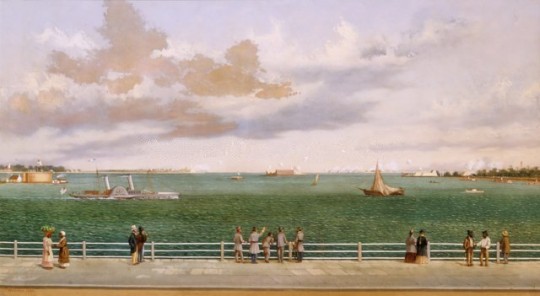"The Fort has surrendered unconditionally, I believe. So far as I can learn, not one soul has been hurt on either side, which after 33 hours bombarding is a little curious. But we live in curious times."
In Our Man in Charleston, Christopher Dickey, an editor at the Daily Beast, takes us inside the Civil War-era British diplomatic mission to Charleston, South Carolina. It follows the enigmatic career of Robert Bunch, a young British diplomat and de facto spy.
The book begins just before a 32-year-old Bunch’s assignment as British consul in Charleston. Having grown up abroad and having already served in the United States, Bunch is determined to make his name there. Seeking to win the trust of the city’s elite, Bunch has an early advantage: His predecessor was detested for his arrogance. Soon, however, Bunch is disillusioned by the despair and suffering under which slaves live. This clogging misery besets his subject every time he steps into the street.
Bunch is infuriated by the intransigence with which Southerners embrace the slave trade and determined to resist it. Dickey describes how the young diplomat successfully saves a 14-year-old who had been serving on a British vessel that ran aground. Under South Carolina’s Negro Seaman Act, any person of African descent serving on a vessel that docked in South Carolina was to be imprisoned. The person could be released only when the ship departed and its captain paid a fine. Knowing the boy would likely be raped in prison, Bunch hides him from the authorities and then cajoles a guard into allowing him to leave for England. Bunch pays a large sum to keep the matter closed. Here, Dickey shows Bunch is aware that his first duty is to British diplomacy. In a letter to Britain’s foreign secretary, Bunch notes his success in freeing the boy but emphasizes his effort to keep the matter off the front pages. He fears that "the indiscreet zeal of Her Majesty’s Consul" could make waves.
Bunch carries out a balancing act between British diplomatic interests and his anti-slavery agenda, one that it is matched by Britain’s own calculations. We see Britain keen both on preserving its relationship with the federal government and maintaining a strong trading relationship with Southern cotton exporters. We see tensions as Royal Navy vessels intercept slave ships around the Caribbean while Bunch attempts to placate furious Charleston contemporaries. Bunch’s emotions begin to get the better of him as the Civil War approaches. Speaking of the looming 1860 presidential election, he tells London that the Democratic party is "by nature both insolent and aggressive," and that should the Democrats win, "the time would come when we should be compelled to vindicate our honor by a war." Though Bunch tries to remedy his outburst the next day, he worries about his career.
This career question is crucial. Although Dickey presents Bunch as a moral man opposed to slavery, his reporting leads the reader to qualify that assessment. Instead, we see Bunch’s career ambitions coming first. Bunch becomes a more fulfilled man as the Civil War proceeds, and Bunch enjoys his new importance to the Foreign Office. He also seems to be having fun. Bunch’s anti-slavery activity sits on the back burner. To be fair to Bunch, the intelligence analysis he provides London is often prescient. Early in his posting as consul, for example, Bunch becomes convinced the South will do anything to preserve slavery, an opinion he shares in London.
Bunch’s increasing self-regard becomes his own worst enemy. He takes greater risks in his dealings with Confederate officials, even though he knows he is under Union surveillance, and is eventually caught out when a courier is intercepted. Furious, the Union then removes Bunch’s diplomatic recognition.
The weakness of Dickey’s book is its exaggeration of British moralism in foreign policy. While Dickey notes that Southern cotton exports were crucial for British textile industry jobs, he underplays the importance of these jobs in shaping British policy. He frequently emphasizes British disgust over slavery but notes that the prime minister, Lord Palmerston, "often seemed to be drifting towards recognition of the South for practical commercial reasons ..." Taking British moral fury at face value, surely it would have supported the Union? Instead she hedged and at some points—as Dickey notes—even considered supporting the Confederacy.
Our Man in Charleston is a fine book, one that reminds spies and diplomats everywhere that there are no dark corners in the wilderness of mirrors. Secrets must be kept secret.
